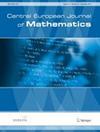The combinatorial derivation and its inverse mapping
引用次数: 5
Abstract
Let G be a group and PG be the Boolean algebra of all subsets of G. A mapping Δ: PG → PG defined by Δ(A) = {g ∈ G: gA ∩ A is infinite} is called the combinatorial derivation. The mapping Δ can be considered as an analogue of the topological derivation d: PX→ PX, A ↦ Ad, where X is a topological space and Ad is the set of all limit points of A. We study the behaviour of subsets of G under action of Δ and its inverse mapping ∇. For example, we show that if G is infinite and I is an ideal in PG such that Δ(A) ∈ I and ∇(A) ⊆ I for each A ∈ I then I = PG.组合推导及其逆映射
设G是一个群,PG是G的所有子集的布尔代数。由Δ(a) = {G∈G: gA∩a is infinite}定义的映射Δ: PG→PG称为组合派生。映射Δ可以看作是拓扑推导d: PX→PX, A∈Ad的类似物,其中X是一个拓扑空间,Ad是A的所有极限点的集合。我们研究了G的子集在Δ及其逆映射∇作用下的行为。例如,我们证明,如果G是无限的,并且I是PG中的一个理想,使得Δ(A)∈I和∇(A)∈I对每个A∈I,则I = PG。
本文章由计算机程序翻译,如有差异,请以英文原文为准。
求助全文
约1分钟内获得全文
求助全文

 求助内容:
求助内容: 应助结果提醒方式:
应助结果提醒方式:


